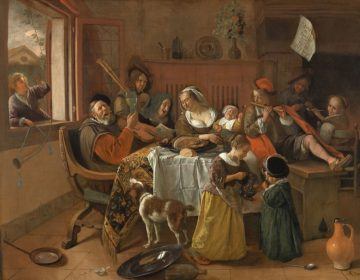Terry Eagleton at Commonweal:
 The governing elites of ancient and medieval Europe were not greatly hospitable to humor. From the earliest times, laughter seems to have been a class affair, with a firm distinction enforced between civilized amusement and vulgar cackling. Aristotle insists on the difference between the humor of well-bred and low-bred types in the Nicomachean Ethics. He assigns an exalted place to wit, ranking it alongside friendship and truthfulness as one of the three social virtues, but the style of wit in question demands refinement and education, as does the deployment of irony. Plato’s Republic sets its face sternly against holding citizens up to ridicule and is content to abandon comedy largely to slaves and aliens. Mockery can be socially disruptive, and abuse dangerously divisive. The cultivation of laughter among the Guardian class is sternly discouraged, along with images of laughing gods or heroes. St. Paul forbids jesting, or what he terms eutrapelia, in his Epistle to the Ephesians. It is likely, however, that Paul has scurrilous buffoonery in mind, rather than the vein of urbane wit of which Aristotle would have approved.
The governing elites of ancient and medieval Europe were not greatly hospitable to humor. From the earliest times, laughter seems to have been a class affair, with a firm distinction enforced between civilized amusement and vulgar cackling. Aristotle insists on the difference between the humor of well-bred and low-bred types in the Nicomachean Ethics. He assigns an exalted place to wit, ranking it alongside friendship and truthfulness as one of the three social virtues, but the style of wit in question demands refinement and education, as does the deployment of irony. Plato’s Republic sets its face sternly against holding citizens up to ridicule and is content to abandon comedy largely to slaves and aliens. Mockery can be socially disruptive, and abuse dangerously divisive. The cultivation of laughter among the Guardian class is sternly discouraged, along with images of laughing gods or heroes. St. Paul forbids jesting, or what he terms eutrapelia, in his Epistle to the Ephesians. It is likely, however, that Paul has scurrilous buffoonery in mind, rather than the vein of urbane wit of which Aristotle would have approved.
more here.
